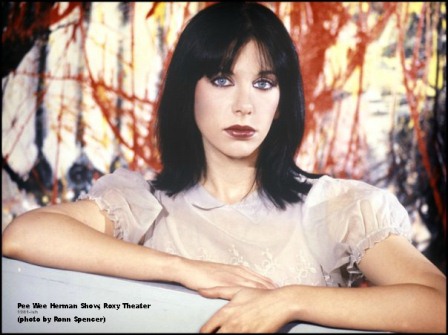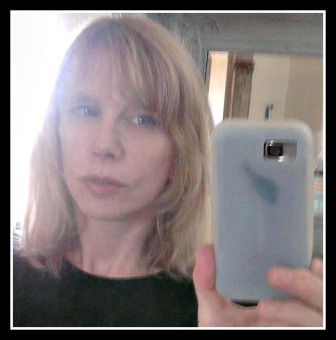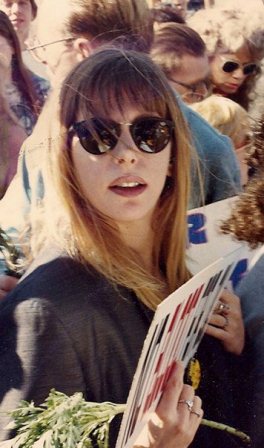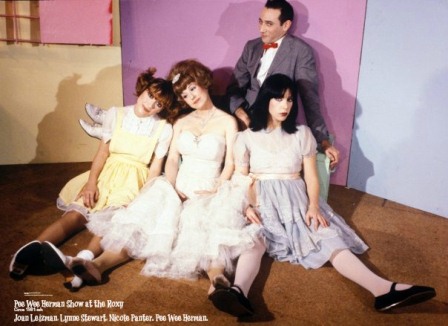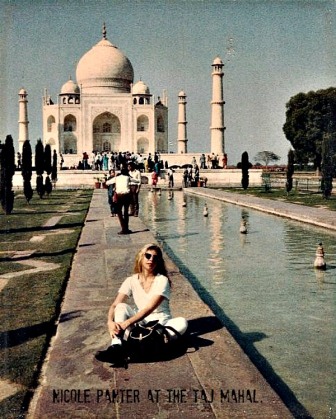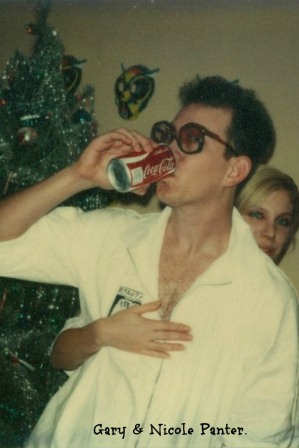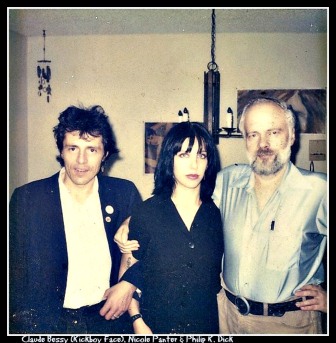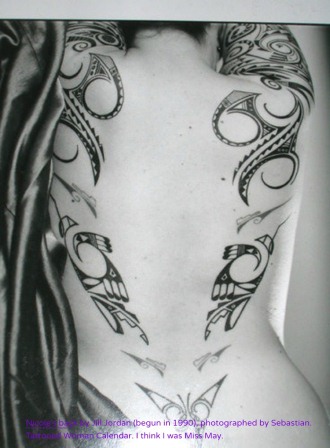
| |||||
|
When I was fourteen, Darby Crash was a monolithic Nietzschean superman whose lyrics churned with rage. I read everything I could about The Germs and the early days of L.A. punk to soak up every drop of creative influence that scene had to offer me. Nicole Panter's name came up quite a bit. Without her, I'm not sure The Germs would have stayed together long enough to become the band that I admired so greatly. As a teacher, author, and activist, Nicole reaches beyond punk and touches us with an uncompromising humanity
Nicole Panter ran away from her childhood home in Palm Springs at 14 to join the circus, but she took a detour to the big city where she and 24 other misfits spontaneously combusted into what would become known as the Los Angeles punk rock scene. She managed the notorious band The Germs, a moment in time that was immortalized in the documentary film, The Decline of Western Civilization. After her 1980 retirement from punk rock, she became an actor & writer (The Pee Wee Herman Show), script editor, the author of a couple of books of fiction, a culture & film critic, essayist, a photographer, a Mojave desert conservationist, an educator and a jeweler. She teaches screenwriting at the California Institute of the Arts (Cal Arts) and has taught at the American Film Institute and The College of Santa Fe. |
Punk Globe: Is it true that you became The Germs' manager when Darby Crash asked you to buy him a beer? What else do you remember about that night?
Nicole Panter: Yes, it is true. We were sitting on the curb outside the Music Machine in West Los Angeles (I don't remember who was playing) and Darby was loudly complaining/boasting that the Germs couldn't book any shows because their fans tore the clubs apart whenever they played and I said "you need a manager and a fake name. What about GI?" He asked me what GI stood for, and I said "Germs incognito." He got the joke and asked me to manage them. This was perfect for me because I wasn't anywhere near finding myself as an artist and despite punk's "learn in public" ethos, I didn't have the confidence to try anything creative so managing a band gave me a way to participate in the scene in a meaningful way. Oh, I didn't buy him a beer that night. I wasn't a very good enabler!
Nicole Panter: I don't remember specifics. I remember that I put the GI plan into motion and that I managed to secure fees of $1000 per show, which was huge back then. I just approached the club managers with confidence and I was organized and trying to be the grownup. I also made them rehearse and cut short any impulses they had to play long shows -- I remember I'd always say to Darby before they went onstage, "leave them wanting more." Meaning the audience.
Punk Globe: Mike Watt told me in my interview with him that Southern California is spread out into a bunch of small towns and the early L.A. punks were usually the only ones in their towns who were into bands like The Stooges and The Ramones, so they all found each other and started playing music together. Was your experience similar?
Nicole Panter: Sort of. I was very first generation LA punk and Watt came a bit later. Glitter was an important stop along the way to punk. T-Rex, The NY Dolls. The Dictators (who were a huge influence on the Ramones). The David Bowie "Diamond Dogs" show at the Universal Amphitheatre seems to have been a watershed event for many of us, who were at one of those shows and would meet a few years later. Also, there were two all ages clubs that were very important in the evolution of early LA punk, The Sugar Shack, in the Valley and Rodney Bingenheimer's English Disco. The Germs met chasing Queen! Punks were also the most knowledgeable, self-educated musicologists I've ever met. Most punks know tons about obscure garage bands from the 60s. The Ramones were more simultaneous with what was happening in LA. Punk spontaneously combusted in LA, NY & London around the same time.
Punk Globe: In Penelope Spheeris' "Decline of Western Civilization," you talk about how difficult it was to get Darby to sing into the mic. You said you had tried everything short of gluing it to his mouth to get him to sing into it. What were some of the things you tried?
Nicole Panter: Bribery? No, really I just tried to impress upon him the importance of singing into the mike by using reason. One of the main things I tried to do was get them to approach things with more self-discipline and with a sense of responsibility to their audience and with less of a masturbatory approach.
Punk Globe: When Penelope Spheeris asked Darby why he got so loaded before he went on stage, he said "so I don't feel the pain." Do you think that if he had gotten treatment he wouldn't have subjected himself to beatings from the audience and maybe been able to deal with some of his emotional issues?
Nicole Panter: "Treatment" which is so ubiquitous now, was pretty non-existent back then. Darby's substance abuse, classically, was really a symptom of far deeper issues. His hidden homosexuality. His chaotic childhood, neither of which he was dealing with in a healthy way. He was acting out in a very feral attempt at relieving the pain he was in. It might be hard to believe, but therapy and rehab and AA/NA were not what people did back then and none of those things were very easy to find, especially if you were an LA street urchin.
Punk Globe: Did anybody in Darby's inner circle actually believe that Darby's five year plan for the Germs would end with his suicide?
Nicole Panter: Well, I can't speak for anyone else, but I certainly never thought he'd kill himself. I also had no idea about his closeted homosexuality, though. I didn't often hang out with Darby socially, I wasn't interested in doing that -- I had a different life -- I was married to Gary Panter and we were very involved in the art scene too. I had sort of outgrown punk as a social scene by the time I quit the Germs on April 1, 1980. As soon as the South Bay boys started coming to shows, everything shifted. Mock violence (pogo) became real violence (slam dancing) and I wanted no part of that. What the first generation had that was missing after that was a kind of Addam's Family/Merry Prankster sensibility and as soon as that evaporated, punk lost it's fascination for me. I missed that mordant sense of humor.
Nicole Panter: I thought they were great. He really articulated the deep emotional pain he was in -- but that wouldn't be apparent until after he'd killed himself, how personal those lyrics really were.
Punk Globe: Have Darby's lyrics influenced your writing at all? Where can people read your work?
Nicole Panter: No, first of all, I'm not a poet or a lyricist. I write essays and fiction. I didn't start writing until I was in my 30s and I approached it from a far less raw place than the teenaged Darby Crash did. I was influenced by prose writers and essayists. Paul Bowles, James Cain, John McPhee, Carson McCullers, Dorothy Parker, John Steinbeck...my vocabulary as a reader was huge because I have always been a compulsive reader, since I was a little kid.
My work is pretty easy to find on the internet, I've written a couple of books, I write for magazines and I am currently working on a memoir that will include the period with the Germs but also cover my strange childhood as a step-daughter of Pat, The King of Steaks, the Philadelphia Cheesesteak king. And my time as a writer/actress on the original Pee Wee Herman Show and a lot of other things, including my lifelong quest for equilibrium in the wake of a very chaotic childhood.
Punk Globe: How come there is no one portraying you in the Germs biopic, "What We Do Is Secret?"
Nicole Panter: I was interviewed at length. They sent me the script ten years before the film got made and it was terrible. It wasn't so much the content (which was pretty bad), but the construction of the screenplay was a disaster. I worked in the film industry for years and for the last 17 years I've actually taught screenwriting at Cal Arts and The American Film Institute and if one of my students turned in the screenplay they gave me, I'd have flunked them. They were clueless as to how scripts work. I made extensive notes on the script and sent it back to them. I told them if the script, as it was was what they were going to shoot, to please take my character out. So they did. And that movie was just laughably terrible. It was a bad wig movie. So I felt vindicated. And I knew that anyone who really wanted to know what the Germs were about wouldn't pay much attention to it and would eventually find The Decline.
Punk Globe: What would you say to a film student who wanted to write his or her own screenplay about The LA punk scene in the '70s?
Nicole Panter: Write a small personal story, don't try to write an epic or hit your viewers over the head with a "message." Create the world you want to write about, don't try to imagine what it was "really" like. There are a number of great documentaries (the best, of course is "Decline of Western Civilization" and not very many great narrative features about punk. My very favorite punk narrative feature is SLC Punk directed by James Merendino. He got the feeling and essence of being a young punk so right that after the movie, my friend (who was also an old punk) and I couldn't talk. We left the theater and without a word, he drove to the ocean, parked in front of it, we looked at the ocean for an hour or so and then he dropped me off at home. We didn't say a single word until the next day. I immediately faxed a fan letter to James via his agents and he wrote me back right away.
I think Rodger who wrote and directed "What We Do Is Secret" had far too rigid an idea about how things were and it crippled him creatively and he was wrong. Plus, there was no craft in that script. Nicole Panter: Well, I'll tell you what I tell everyone who asks: My punk rock did not have a reunion clause in it. I love Pat and Lorna, but when your singer/main songwriter has been dead for 30+ years, if you hire an actor to play him onstage and no new material is being written, you risk becoming a lame nostalgia act, like Sha Na Na. And my punk would have sneered at nostalgia, kicked it in the ribs and spit on it's body. In my mind, I hear Kickboy sneering in his French accent: "what the fuck iz theees sheeet???" To kids who think they saw the Germs with Shane West, I'm sorry, you did not. No Darby = No Germs.
Punk Globe: I had great conversations with Don Bolles and Lorna Doom when the reunited Germs came to Baltimore. Do you still keep in touch with them?
Nicole Panter: I recently saw Don at a party for Hellin Killer, but I don't have much to say to him after "hello." Darby wasn't a Don fan and neither was I. I suspect Darby is spinning in his grave over that re-write of history that bears Don's name. That's the cautionary tale in all this to potential teenage suicides: Your enemies will re-write your history to make themselves look better and be more important in your story.
Punk Globe: What was the first thing you did after the original Germs line up broke up?
Nicole Panter: I had quit first, and they broke up shortly after that. I was not surprised, I was the grownup and from what I heard, things deteriorated into the petty quarrels between everyone and that was one of the main reasons I quit. I wasn't surprised, and I'd left the band on good terms. Darby came to visit me a number of times, and I was on to the next thing in my life which was the Pee Wee Herman Show.
Punk Globe: How did you get involved with the Pee Wee Herman Show?
Nicole Panter: The woman who had the idea for the show, Dawna Kaufman called my then-husband and I to see if we wanted to contribute. She knew who we were because of our prominence on the local punk scene.
Punk Globe: How did you get interested in photography and what made you want to start exhibiting your work?
Nicole Panter: I started taking photos and they became pretty good with practice and I was offered the opportunities to show the work. The writing happened the same way, but it happened first. Unlike many artists, I didn't presume that I was an artist, quite the opposite, because I did not have supportive parents or a home life that was conducive to self-confidence. My parents were undermining, not encouraging. Things were chaotic and ugly in our household so it wasn't until I had years between them and me that I felt confident enough to show my work (photo or writing) to anyone else. Being around so much art and so many artists after I left home gave me a sense of style and an eye. Also seeing bad art -- anytime you look at something and think: "I could do that better" it gives you some confidence to create something.
Nicole Panter: Not Ray in particular, but many of the people I know and am still friends with are people from the scene.
Punk Globe: How did your 7-inch EP on Kill Rock Stars come about?
Nicole Panter: I had a couple of books of fiction come out and was doing readings, including some high profile ones at NXNW in Portland and Slim Moon contacted me and asked if I wanted to do a single. Of course, I said yes! We called it "The Story Lady" and I'm really proud of it. I have some left and if any readers want to purchase one, email and I will let you know the details of how to get a personalized, signed copy (nicolep7@aol.com).
Punk Globe: What kinds of things get you excited creatively?
Nicole Panter: Visual art, photography, non-fiction writing. Knowledge gets me most excited creatively because it sparks the thought process and takes you down the road to producing work. The best artists I know are information sponges for all mediums.
And very ironic for someone who didn't set foot in the daylight for years, nature excites me, though I still keep funny hours.
Punk Globe: This being an election season, what issues are most important to you and why?
Nicole Panter: Income inequality; gay/women's/children's/minority rights; climate change; health care (I'm one of those who dream of single payer!). God, all of it. We are in a dark place in this country and I am thankful I am not in my 20s. I do not even know how to reassure my students, because I think we are circling the drain. And punks warned them decades ago, but no one really listened.
Punk Globe: Is the Bohemian Women's Political Alliance still active?
Nicole Panter: In spirit. The world was very different when I founded the BWPA. You can't be that feisty and be political these days (plus we were younger and all pretty cute, which makes things way easier) and be taken seriously -- the right has dictated the terms of the discussion and anything that is adamantly progressive is dismissed out of hand. We raised a small fortune in a very short time for a lot of good causes. It was intense and beautiful and I am very, very proud of my part in it. A number of women have gone on to be important activists for the specific causes they became passionate about. The BWPA manifesto is the best piece of writing I have ever done and every word of it is as true today as it was in 1990.
Nicole Panter: Oh, boy that's a big question these days. I think it is broader than just this country and the problems really seem so monolithic these days. As far as this country goes, as long as the corporate, petrolium, bank and gun lobbies own our politicians, we're screwed. Then there is partisan gridlock. On top of that, the religious right seems determined to make the rest of us live in the country they envision and they've been so smart about it. I never thought I'd see the erosion of women's rights, let alone the discussions we're seeing about "legitimate rape" by elected officials. So there are a lot of bad actors at work.
I have always thought that the biggest issue we face globally is overpopulation, but these days if you even mention the word, you are shouted down. Which is ridiculous. I chose not to have children and I am absolutely convinced I did the right thing, it's not a very wonderful world we are leaving to you guys in so many ways. Climate change has to do with overpopulation, but also the fact that our technology and industry evolved so much more quickly than the humans who've created it, so basically we're like toddlers who've been playing with loaded .357 handguns -- we don't have the good sense to use the monster technologies we've created -- from the internal combustion engine on up -- with an eye towards sustainability. It seems what you guys need to do is figure out how to reform the political mess we're in by demanding your politicians work together for the benefit of the people and that special interests no longer have the kind of voice they have, especially when it is counter to the interests of the people. That climate change is dealt with. Also, Democracy is not synonymous with "Christianity" and unless you want to be praying to Jesus and waiting for the rapture, that question must be addressed. There is so much to do, but I'm afraid you are going to have to raise your voices and change the way we are living. Punk Globe: Thanks again for this interview, Nicole. Any final words for Punk Globe readers?
Nicole Panter: You're welcome!
Well, punk is especially relevant in this day and age -- our job was always to loudly and clearly point out when the Emperor wasn't wearing any clothes and that is even truer today. Pussy Riot finally did what punk promised it was going to do three decades ago: Fuck shit up!
|
|
|
